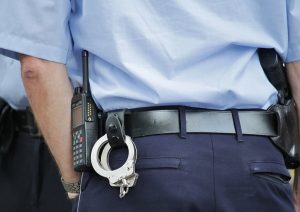 A former Baltimore Police Sergeant has been sentenced to almost two years in federal prison for conspiracy to deprive civil rights under 18 U.S. Code § 241. The sentence was handed down in the Baltimore City federal courthouse this week, more than 6 years after the actual incident. According to facts presented at plea hearing, the former BPD officer first joined the department in 1992 and became a sergeant in 2011. During the time when the incident occurred the officer was in charge of a Special Enforcement Section in the department’s Western District. This area is notorious for a high volume of drug and gang activity, and is home to some of the most dangerous areas of the city. In March of 2014 while the defendant was working as an officer-in-charge, he received a phone call from another officer who stated that he had just ran over an arrestee in front of a Northeast Baltimore home. At the time he received the call he was having dinner with a BPD detective. In a regrettable course of conduct the officer obtained a BB gun from another BPD colleague, drove to the scene of the accident and planted the BB gun in the area where the arrestee had been injured. The arrestee was actually already in the hospital when the defendant planted the gun. Additional BPD officers then noticed the BB gun, packaged it as evidence and charged the injured arrestee with possession, use or discharge of a pellet/BB gun. The arrestee was held without bail for ten months at the detention center before the charges were ultimately dismissed by the State.
A former Baltimore Police Sergeant has been sentenced to almost two years in federal prison for conspiracy to deprive civil rights under 18 U.S. Code § 241. The sentence was handed down in the Baltimore City federal courthouse this week, more than 6 years after the actual incident. According to facts presented at plea hearing, the former BPD officer first joined the department in 1992 and became a sergeant in 2011. During the time when the incident occurred the officer was in charge of a Special Enforcement Section in the department’s Western District. This area is notorious for a high volume of drug and gang activity, and is home to some of the most dangerous areas of the city. In March of 2014 while the defendant was working as an officer-in-charge, he received a phone call from another officer who stated that he had just ran over an arrestee in front of a Northeast Baltimore home. At the time he received the call he was having dinner with a BPD detective. In a regrettable course of conduct the officer obtained a BB gun from another BPD colleague, drove to the scene of the accident and planted the BB gun in the area where the arrestee had been injured. The arrestee was actually already in the hospital when the defendant planted the gun. Additional BPD officers then noticed the BB gun, packaged it as evidence and charged the injured arrestee with possession, use or discharge of a pellet/BB gun. The arrestee was held without bail for ten months at the detention center before the charges were ultimately dismissed by the State.
While not directly related to the Gun Trace Task Force scandal and subsequent indictments, the defendant’s actions likely came to the attention of law enforcement after the investigation and arrest of numerous GTTF officers. After the officer who hit the arrestee and six other GTTF officers were arrested the dominoes began to fall, and the former sergeant became nervous about his involvement with the BB gun incident. He arranged a secret meeting with the same BPD detective he was with when he received the original call about the accident. The meeting took place at a swimming pool to ensure that neither party was wearing a wire, though in hindsight this only proved the former sergeant’s guilty conscious. During the meeting the former sergeant attempted to induce the detective to lie to federal investigators by stating that they were both at the scene of the accident for the purpose of scene security. He also told the detective to say that the BB gun was already in the sergeant’s trunk, which was also not true. It seemed at that point the sergeant already knew he was going down, and had shifted to a mitigation strategy. In reality this meeting turned out to make matters much worse for the former sergeant, and showed the government that he was not willing to accept responsibility for his actions even after the feds became aware of the BB gun incident. The defendant likely saved himself a few months in jail by pleading guilty, but based on the evidence there was no way a prison sentence could be avoided. The case was investigated by the FBI and prosecuted by the same U.S. Attorney who went after the former mayor of Baltimore City, and who is currently prosecuting the Baltimore City State’s Attorney.
The Blog will continue to follow cases involving public corruption and misconduct in office, and we will post articles as news becomes available. If you have a question about a criminal law or have been charged with a crime, contact Maryland defense lawyer Benjamin Herbst anytime at 410-207-2598. Benjamin has successfully represented government employees in charges such as misconduct in office and bribery, and has also represented police officers, correctional officers and public figures in high profile assault and theft charges. Benjamin accepts cases in all Maryland jurisdictions including the federal courts in Baltimore and Greenbelt. He is licensed to practice law in Florida, and has extensive experience defending those charged in Miami, Broward and Palm Beach Counties with gun and drug offenses as well as fraud, theft, aggravated assault and battery.
 Criminal Defense Lawyer Blog
Criminal Defense Lawyer Blog










